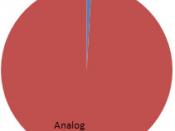In 2003, the RIAA, or Recording Industry of America, launched lawsuits against 261 peer-to-peer file sharing users for illegally downloading copyrighted music. Before these lawsuits, the legality of file sharing was widely debated, and all the while P2P file sharing was wildly popular.
The lawsuits included users of the eDonkey, Limewire, Bearshare, Napster, and Kazaa services, as well as 25 people using university Internet connections to distribute music files. American University in Washington, D.C., Boston College, Iowa State University, and the University of Massachusetts were among the college networks used by those sued. At least 20 U.S. universities signed agreements with pay-for-music services as of August, and more signed agreements since then, according to the RIAA.
Since September 2003, the RIAA has filed more than 7000 lawsuits, including more than 2200 lawsuits announced since October 1, against alleged file traders.
Do I think that RIAA should stop filing lawsuits against people who illegally download? Absolutely.
I am sure that a lot of people agree with me and I am sure a lot of people would disagree with me. This is why I think why RIAA should not go after people who illegally download:
First of all, the fact that RIAA, and other different organizations has an access to browse one's hard drive's data for evidence of illegal file swapping. Allowing someone to look through individual's hard drive without a court order is a violation of personal privacy laws. I believe that it is setting a scary precedent. Sure, some might look at it that watching someone's online behavior as one uploads and downloads illegal copies of copyrighted songs is equivalent to watching a thief load and unload stolen goods from one's closet. However, I believe it is not fair for anyone to be able to browse a person's hard drive's...


